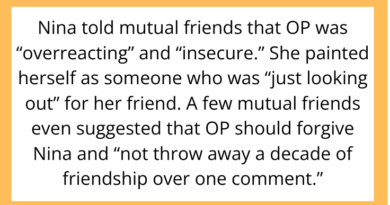AITAH for Not Attending My Sister’s Wedding Because She Scheduled It on My Birthday?
Family events are supposed to bring people together, but sometimes they spark conflicts no one sees coming. In today’s AITAH story, one sibling feels hurt and overlooked after a wedding date was set on the same day as their birthday—and everyone is debating whether skipping the big day was petty or justified.
Let’s look at the details and decide who, if anyone, is actually in the wrong.
The Situation: A Wedding Date That Felt Like an Insult

The original poster—let’s call him Adam, age 29—shared on r/AITAH that his younger sister, Megan, recently got engaged. Everyone was thrilled—until she announced the wedding date: the same day as Adam’s 30th birthday.
To Adam, this felt like a deliberate slight. He and Megan have always had a tense relationship, marked by competition and unresolved arguments. In his post, he explained that she knew how important this milestone birthday was to him. He’d been planning a trip and a party with friends for over a year.
When he gently brought up the conflict, Megan brushed it off, saying, “It’s not like you’re five—you don’t need a party.” She insisted that weddings take precedence over birthdays and expected him to “be mature” and show up in support.
Adam felt hurt and dismissed. After some reflection, he decided not to attend the wedding. He told Megan he’d celebrate his birthday as planned. She was furious, called him selfish, and accused him of trying to sabotage her big day.
The Debate: Is a Birthday Ever More Important Than a Wedding?

The r/AITAH community quickly weighed in with thousands of comments—many passionately defending Adam’s choice, and others insisting he was overreacting.
Why People Think Adam Isn’t the Villain
-
Milestone birthdays matter: Turning 30 is a major life event, and he had planned well in advance.
-
He was given no consideration: Megan could have chosen nearly any other date, but picked the one she knew would be sensitive.
-
It wasn’t an outright refusal to celebrate: He simply didn’t want to cancel his own plans.
As one commenter put it:
“Your sister sounds dismissive and entitled. You get one 30th birthday, and she could have been more thoughtful.”
Why Some Think Adam Overreacted
-
Weddings are once-in-a-lifetime (ideally): For many people, they take priority over birthdays.
-
Family support matters: Skipping a sibling’s wedding could cause lasting damage to the relationship.
-
Compromise was possible: Adam could have celebrated his birthday on another day or attended part of the wedding.
Another user countered:
“You don’t have to be the center of attention on someone else’s wedding day. This is a big moment for her too.”
The Bigger Issue: Family Dynamics and Unspoken Tensions

Reading between the lines, it’s clear this wasn’t only about the date. Adam and Megan’s history of rivalry and resentment colored every interaction. Sometimes conflicts over seemingly small details are really about deeper issues that were never resolved.
When someone feels chronically overlooked, a scheduling decision like this can feel like the last straw.
Finding a Middle Ground (If There Still Is One)

While Adam chose to stand his ground, some commenters suggested compromises:
-
Split the day: Attend the ceremony, then leave for his birthday plans.
-
Celebrate his birthday on another weekend and save the milestone trip for later.
-
Have an honest conversation to clear the air instead of letting resentment fester.
But ultimately, if attending would cause more hurt than healing, it’s not always wrong to step back.
The Takeaway: It’s Okay to Set Boundaries, Even Around Big Events

This AITAH scenario proves a universal truth: You can’t please everyone. Sometimes your best choice is the one that protects your own well-being, even if it disappoints others.
Adam’s decision might feel extreme to some, but if it was made thoughtfully—and without the intent to hurt—he has the right to honor his own milestones and needs.



